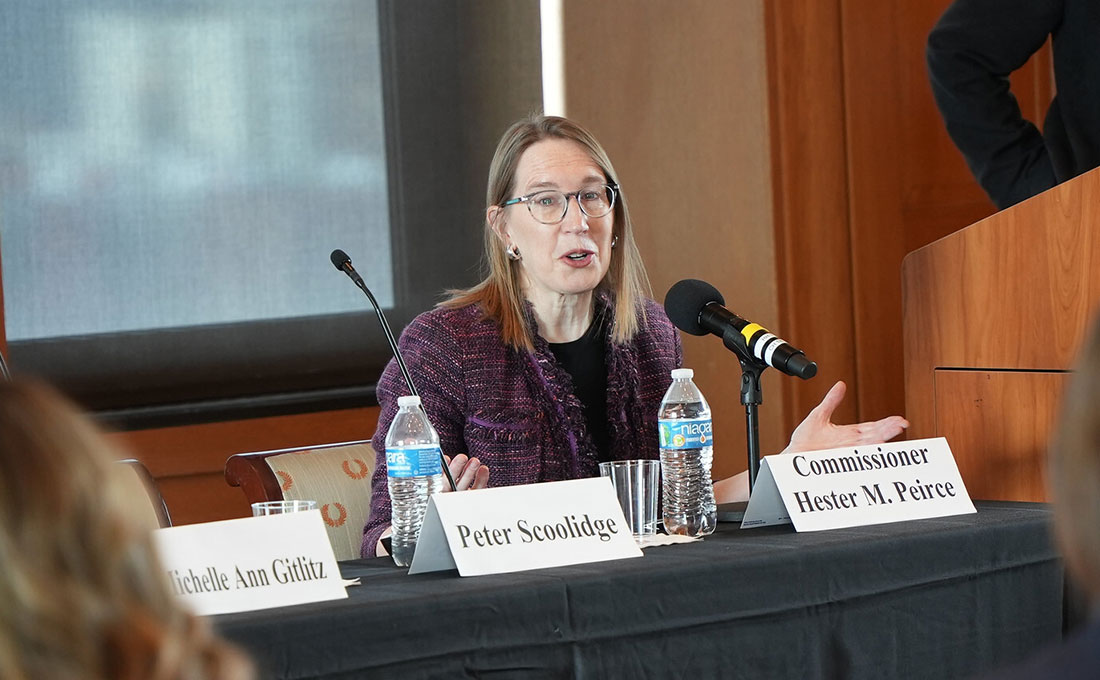Fintech Law Event Features SEC Commissioner Q&A With Students, Expert Panelists

Commissioner Hester M. Peirce of the Securities and Exchange Commission fielded questions from Brooklyn Law students in a law and policy Q&A, which, along with a fintech panel, was part of a wide-ranging legal discussion of cryptocurrency, high-frequency trading, and other financial technology—all at a time when regulators face the fast-evolving landscape fintech has created.
The April 5 event, titled “ETF Spots and Crypto Bots: The Evolving Frontier of Fintech Law and Policy,” was held at the Forchelli Conference Center, and offered attendees CLE credit. Before calling on students and attendees to ask questions, Professor of Clinical Law Jonathan Askin asked Peirce about what it is like to work at the SEC and its approach toward fintech. “How do folks keep track of technological developments that may, in fact, affect financial markets and securities?” he asked.
Peirce explained that, among the 4,500 employees of the SEC, there is an Office of Technology that serves as the hub for financial technology and has been lately focusing a great deal on artificial intelligence.
“So those people are extremely knowledgeable, and they're following all the latest developments in technology, they're experimenting with different things. But for the rest of us, a lot of what we're doing has nothing to do with technology,” said Peirce. “We're just trying to stay ahead of these massive rules that are coming our way and enforcement actions, which we're considering…It’s really quite the job to keep up.”
The agency works with other relevant agencies both inside the United States and internationally on securities regulation overall and cryptocurrency.
She urged students who are interested in fintech regulation to take administrative law, if they have not already, and said that when she worked at a law firm, her perception of how the SEC worked was not fully informed.
“I think one thing that you don't really learn in administrative law is that each agency has such a different character, you really have to get inside an agency to understand how it works,” Peirce said. “And what you realize is that a lot of the day-to-day activity of the SEC really is the staff engaging with people and trying to weave a very complex set of rules and trying to help people understand how those rules apply to their unique facts and circumstances.”
That bread-and-butter work has slowed in recent years as the agency has become more risk-averse, and slower to address issues related to fintech, said Peirce, who had noted that she was sharing her own opinions, not that of the SEC, during the Q&A. She would like to see innovations addressed more expeditiously than they are.
“It's really a very troubling problem. Because if you can't get these deep experts in securities law to really grapple with these difficult problems, I don't know how we're going to move forward,” she said.
Askin interjected that the lag in the SEC addressing such issues presents a prime opportunity for interested students after they graduate, and Peirce agreed.
She shared some career advice: “There are a lot of lawyers at the SEC, so being in law school is a good start, but try to learn some of the accounting and try to get that financial side of things as well,” Peirce said. “Take as much administrative law as you can, and then I would say intellectual curiosity is very important. You can help yourself to understand the financial industry by reading the financial press, and then getting to know the technology. I think that will be very, very important.”
President and Joseph Crea Dean David D. Meyer, who welcomed attendees to the Law School, fittingly mentioned the community’s recent loss of Professor Emerita Roberta Karmel, the first woman to be appointed as an SEC commissioner, and a longtime professor at the Law School. “She was someone who blazed a trail, and here at Brooklyn Law School, she was an imminent scholar and brought great national acclaim to our faculty,” Meyer said.
Peirce also spoke of the lasting influence at the SEC of Karmel, whom she had a chance to interview early on in her tenure at the agency. “Yes, she was the first woman Commissioner, but I think, for me, the most interesting thing about her is that she was just always intellectually curious,” Peirce said. “It is such a delight for me to go back now and read her speeches. I routinely go back and say, ‘What did she say about this issue?’ Because a lot of the issues that look new are not really so new, and her analysis of those issues was brilliant then and it is brilliant now and still informs my thinking.”
The panel that followed featured Michelle Ann Gitlitz ’04, managing partner at the New York office of Arktouros and the author of Reimagining Payments: The Business Case for Digital Currencies (Racquet Publishing, 2023); Jason P. Gottlieb, partner and chair of digital assets and chair of white collar and regulatory enforcement, Morrison Cohen; Vijay Raghavan, associate professor of law; and Kayvan Sadeghi, partner at Jenner & Block. The moderator was Peter Scoolidge ’08, partner at Scoolidge, Peters, Russotti & Fox.